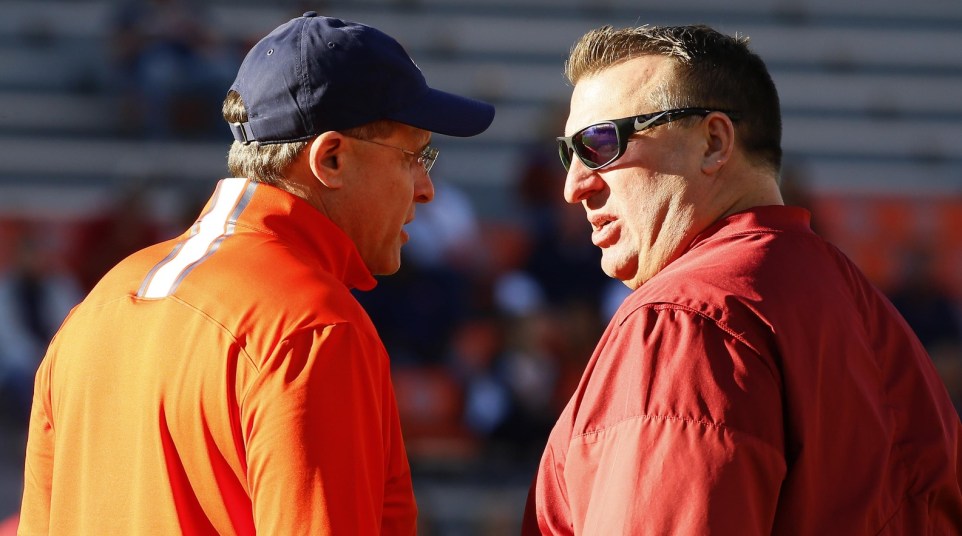
Why December will be the new craziest month of the college football season
Once upon a time, December was a relatively uneventful month of the college football season.
There were no conference title games, pre-New Year’s Day bowls weren’t of much significance, coaches were kept through the postseason and National Signing Day was still more than a month away. It wasn’t long ago that December was reserved for student-athletes “catching up” on their academics.
Oh, how times have changed.
Besides the fact that for the first time every Power 5 conference will play a championship game, this December will be unlike any we’ve seen before in college football. There will be a new addition to the month’s calendar of events that impacts everyone, including those 6-8 teams vying for a College Football Playoff spot.
The new early signing period will begin this year, which could have a ripple effect unlike any December event before it. When the Collegiate Commissioners Association approved the new 72-hour early signing period (Dec. 20-22, 2017) over the summer, it added even more force to the tornado that has become December in college football.

Credit: The Tennessean -USA TODAY Sports
Just in case you didn’t read past the the “NCAA approves early signing period” headline over the summer while you were watching replays of LSU-Auburn on SEC Network, here’s a little refresher of what it means.
Coaches are going to do everything in their power to avoid any February signing day drama. They want the majority of their class signed before Christmas or even before they play a bowl game. The pressure put on kids to sign early will undoubtedly increase, and it’ll make for some heated three-week battles after the regular season ends.
Ah, but therein lies the root of said craziness.
December, as we know, has become the most active month in the coaching carousel. Nobody is waiting until after a bowl game to make a move on a head coach. At the latest, that move happens in November, usually the first day after the regular season finale. The hiring, however, doesn’t happen until at least the first or second week of December.
Let’s map out a little timeline of how this would look and add the new early signing period to the mix (in bold):
- Nov. 16, 2014: Florida A.D. Jeremy Foley announces Will Muschamp will step down at season’s end
- Nov. 29: Florida loses regular-season finale at Florida State
- Dec. 4: Jim McElwain agrees to become Florida’s new coach
- Dec. 20-22: Florida signs first recruits of McElwain era (in this hypothetical world)
- Dec. 23: Doug Nussmeier hired as offensive coordinator
- January 5, 2015: McElwain finalizes staff with hiring of Randy Shannon as co-defensive coordinator
Florida’s timeline, in my opinion, was of the speedier variety. A lot of programs wait another two weeks to announce a coaching change. Having a head coach hired a week after the regular season finale is quick, too. You’ll notice that even with Florida’s ramped up timeline, it still didn’t even have its coordinators in place until after when the early signing period would’ve been.
The troubling thing is that there’s really not a lot that can be done to expedite the coaching hiring process. Coaches aren’t leaving their programs in the middle of the season. Still, athletic directors will have significantly more pressure on them to have a new coach in place in that first week of December. That essentially gives a new coach just two weeks to try and hire an entire staff and oh, sign as many recruits as possible.
That’s insanity.
It’s hard enough for a new coach to hire a staff and sign a class in the roughly eight weeks it usually gets. Now, take away 75 percent of that time.

Credit: Jerome Miron-USA TODAY Sports
This is, of course, the first year of this early signing period. We don’t know how many kids will be on board. But with early enrollees at an all-time high, it would be surprising if the majority of recruits still waited until February to sign.
The dynamic this will create will be unprecedented in college football. The coaching carousel rumor mill will be cranked up to a new level because of all the interviewing and vetting that has to take place in that first week of December.
Any big-time program with a potential coaching move to make (Tennessee, Nebraska, etc.) is going to do whatever it can to reduce the window of uncertainty for recruits. Going two weeks without a head coach in December with that early signing period looming could be extremely costly. As a result, the recruiting rumor mill is going to reach new levels of craziness in December.
It’s funny because I spent some time at IMG Academy in Bradenton, Fla., shortly after the early signing period was announced. IMG is home to the highest consolidation of blue-chip football recruits in the country, which made it the perfect place to gauge the reaction about the new early signing period.
It turns out, it was never even discussed there. The recruits who did see the news didn’t think it went into effect until next year. I informed them at it was indeed beginning in 2017.
And it’s going to make for one wild December.
